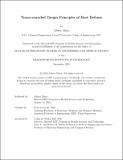Tissue-encoded Design Principles of Host Defense
Author(s)
Misra, Aditya
DownloadThesis PDF (70.33Mb)
Advisor
Nowarski, Roni
Terms of use
Metadata
Show full item recordAbstract
Inflammatory diseases have been rising in incidence over the past few decades and are a result of inappropriate activation of tissue-resident immunity. This inappropriate activation
can be derived from any number of cell types, including immunoregulatory functions of non-immune cells such as epithelial cells. In this thesis, we investigated tissue metabolism
and inflammation across different temporal and spatial scales using a unique combination of metabolomics, mathematical modeling, metabolic assays, and chemical characterization.
Our aim was to identify pathways that protect against inflammation-induced tissue damage and improve clinical outcomes. Thus, we studied A) chronic local tissue inflammation using a colitis model (Chapter 2) and B) acute systemic inflammation using a sepsis model (Chapter 3). In each disease, we studied changes in tissue architecture and the resulting cross-talk among cell types in the microenvironment. In colitis, we found that upon release during tissue damage, IL-18 launches a unique metabolic program in macrophages that 1) exhibits bistable and hysteretic behavior, 2) provides protective memory against inflammatory challenge, and 3) relies on positive feedback with intestinal epithelial cells to maintain the program. In our mouse model of bacterial sepsis, we performed liver tissue metabolomics and found that branched-chain ketoacids (BCKAs), metabolic products of branched-chain amino acids, are released during systemic inflammation and serve as endogenous antioxidants that neutralize extracellular peroxides. They thus reduce tissue damage and increase survival rates by more than double. Through this thesis, we show tissue-intrinsic mechanisms that 1) organize positive feedback loops among cells to establish protective memory against inflammation and 2) secrete endogenous antioxidants to limit pathogenic extracellular oxidants induced by inflammation without quenching bactericidal intracellular oxidants.
Date issued
2024-09Department
Harvard-MIT Program in Health Sciences and TechnologyPublisher
Massachusetts Institute of Technology